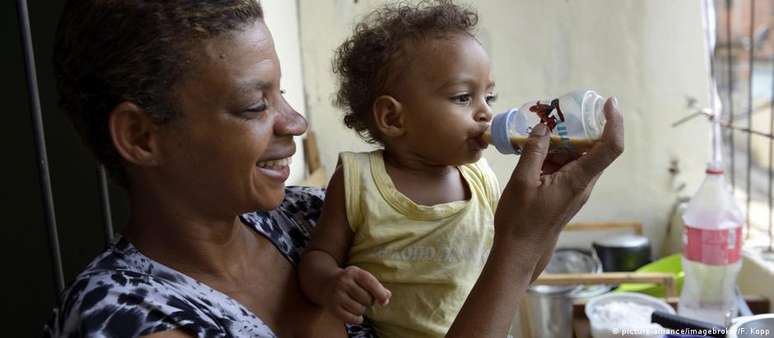“If we were to write a new constitution, extending maternity leave from 120 to 180 days should be a constitutional precept,” says a sociologist who chaired the 1988 national women’s campaign in the constituent. (CLT) were entitled to leave maternity leave of only 84 years. days until 1988. From that date the benefit was extended to 120 days. Considered an advance at the time, this right no longer meets current needs: since 2008, the Brazilian Society of Pediatrics has been fighting for the extension of maternity leave from 4 to 6 months for all mothers, since during this period the child must receive exclusively breast milk on request.
“The progress of the 1988 Constitution was very innovative for that historical moment. In addition to the increase in maternity leave, the right to day care for children aged 0 to 6 was incorporated, as well as social benefits for women rural and domestic workers, the benefits are the fundamental one for exercising the role of caring for children, which belongs to women”, says sociologist Jacqueline Pitanguy, executive coordinator of the organization Citizenship, study, research, information and action (CEPIA) .
In the 1980s, Pitanguy chaired the National Council for Women’s Rights (CNDM), where she coordinated the national Mulher e Constituinte campaign, created by the feminist movement to debate the rights related to the status of women in Brazil that the new Constitution should contemplate. .
Thanks to the action of women like Pitanguy, in addition to the 4 months paid leave for working mothers, since 1988 the labor code has granted job stability to pregnant women from the day of the pregnancy assessment until five months after giving birth to avoid – or at least delay – the dismissal of the woman on maternity leave.
Since 2008, the federal government has also given tax breaks to private companies that take 180 days of maternity leave, another major achievement. On the other hand, the right to job stability was not extended to these female workers, allowing mothers who had 6 months of leave to be fired in the last month of maternity leave.
“A son is not just a mother’s”
With the slogan “a child is not only a mother’s”, the national Mulher and Constituinte campaign managed to include paternity leave in labor legislation, in order to promote a more equal division of labor between fathers and mothers. The leave for working parents, on the other hand, is only 5 days.
“If we were to write a new constitution today, certainly the extension of maternity leave to 180 days should be a constitutional precept, as well as the possibility that this leave can be used in the most convenient way by the father and mother, as it happens in some European countries,” says Pitanguy.
In 2008, fathers who work for companies enrolled in the Empresa Cidadã program are now entitled to 20 days of paternity leave. For the sociologist, however, the period is insufficient.
“A more equal division of roles between fathers and mothers in childcare should also be reflected in labor legislation and social benefits to ensure that men take responsibility for childcare, such as children’s health and education” Pitanguy points out.
“Mother care is also work”
In 2021, Argentina passed a law that guarantees the right to a pension for women aged 60 and over who have not reached the time necessary to act in the labor market due to motherhood. Argentine law also establishes that the length of maternity leave for working mothers is incorporated into the calculation of retirement age.
In Brazil, so-called “housewife” mothers, i.e. women responsible for the unpaid role of taking care of the home and family, are not entitled to a pension if they have not made regular contributions to the INSS, the National Institute of Social Service. In short, for a woman to retire, regardless of whether she is a mother or not, she must be 62 years old and have contributed to the INSS for 15 years.
In 2021, a bill entitled Maternal care is work (PL 2757/21, by federal deputy Talíria Petrone), also proposed retirement at the minimum wage for women over 60 who do not have the years of contributions necessary for the INSS, but who they did household chores. The project is attached to PL 2647/21, by the deputy Perpétua Almeida (PCdoB), which also provides for the counting of service time for tasks related to the education of biological or adopted children, providing, for pension purposes, that it be calculated:
1 year of service for each child born alive;
2 years of service for each adopted minor;
2 years for each biological child born with permanent disability.
PL 2647/21 has been in the Chamber of Deputies since the end of last year, pending the appointment of a new rapporteur in the Health Commission.
The Oxfam report Time to Care: Unpaid and Underpaid Care Work, released in 2020, showed that unpaid care work within homes and families – such as caring for the home, children and other members of the family – is carried out by women in 85% of cases. In addition, worldwide, women and girls devote 12.5 billion hours a day to unpaid housework and care work.
While home and family care is not considered a job in itself, the Oxfam report calculates that if this predominantly female paid job were paid, it would contribute at least $10.8 trillion a year to the global economy, equal to more three times the value of the world’s technology industry.
“Already at the time of the 1988 constitution there was a movement for the right to a pension for ‘housewives’. This has not become a right to this day. Taking care of children is undoubtedly a form of work that should be considered and included in Brazilian legislation for retirement purposes,” says Pitanguy.
Other urgent rights to be recognized in the field of maternity in Brazil, according to Pitanguy, concern the vacancies in day care centres.
“It is necessary to ensure that children’s right to day care is effectively respected not only in formal work spaces, but also for informal workers and unemployed women, because, without full-time free public day care, women mothers are unable to look for work,” says Pitanguy.
What about single moms?
Luiza, from São Paulo, is the only mother of a 7-year-old girl. She has been unemployed for five years since her daughter’s father left home.
“I’ve never had a formal job since my daughter was born. We’ve lived on a ‘job’ and Bolsa Família for five years. It would be great to have government help for single mothers, since I can’t even count on a my daughter’s father’s pension,” says Luiza, who prefers not to be identified.
Single-parent households headed by mothers, such as Luiza’s, account for 14.7% of households in the country, according to the Continuous National Household Sample Survey (Continuous PNAD) published in the second half of 2022.
Thinking of these millions of single mothers, the bill 2099/2020 was presented in 2020, which proposes permanent aid of BRL 1,200 per month to women providers of single-parent families, i.e. families headed by single mothers. To receive the subsidy, according to the PL, the woman must be over 18 years of age, not have an active formal job, not be in receipt of a social security or welfare benefit, as well as have a monthly per capita family income up to half the minimum wage or monthly total family income up to 3 minimum wages.
Luiza says a monthly allowance of R$1,200 would be “decisive for her and her daughter’s well-being and food security,” she says. Despite this, the Pl has been stuck in the Health Commission since January, which awaits the designation of a new rapporteur to resume work.
In 2021, another bill on single mothers, PL 3717/21, was proposed by Senator Eduardo Braga (MDB). The project determines the priority for the care of single mothers with a per capita household income below two minimum wages and dependents up to 18 years of age in different social, labor and economic policies, such as:
Guarantee quotas in large companies for single working mothers;
Prioritize single mothers for daycare vacancies;
Prioritize families of single mothers in housing or land settlement programs.
Double payment of social benefits to single mothers
Known as the Single Mother’s Rights Law, PL 3717/21 has already been approved by the Senate, but has been pending in the Chamber of Deputies for over a year, since March 2022.
“The concept of family is plural. Therefore, it is necessary to constitutionally guarantee that the responsibility of the State and private initiative in the care of children extends to single-parent, homoaffective and transgender families”, concludes Pitanguy.
Source: Terra
Rose James is a Gossipify movie and series reviewer known for her in-depth analysis and unique perspective on the latest releases. With a background in film studies, she provides engaging and informative reviews, and keeps readers up to date with industry trends and emerging talents.








